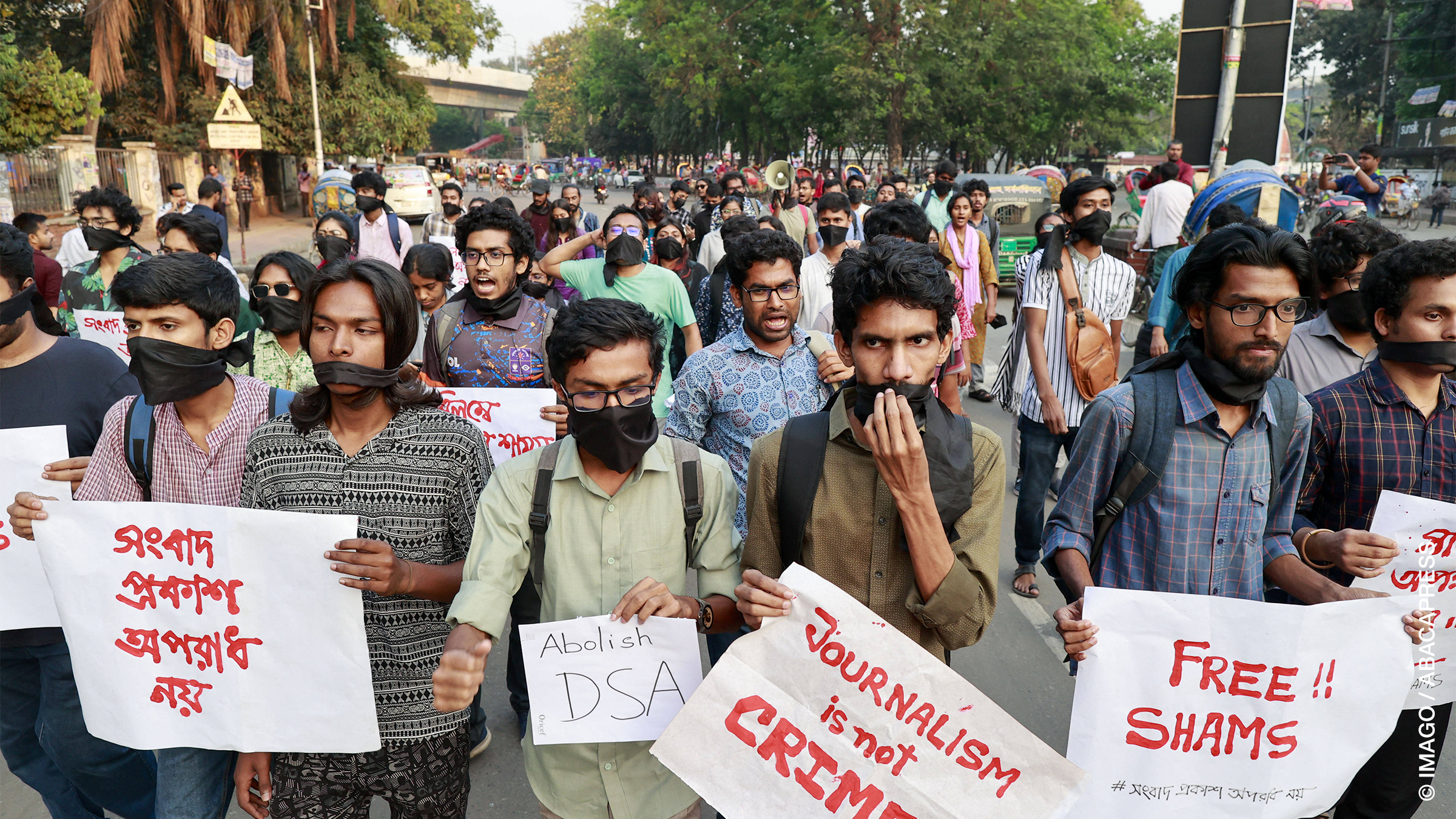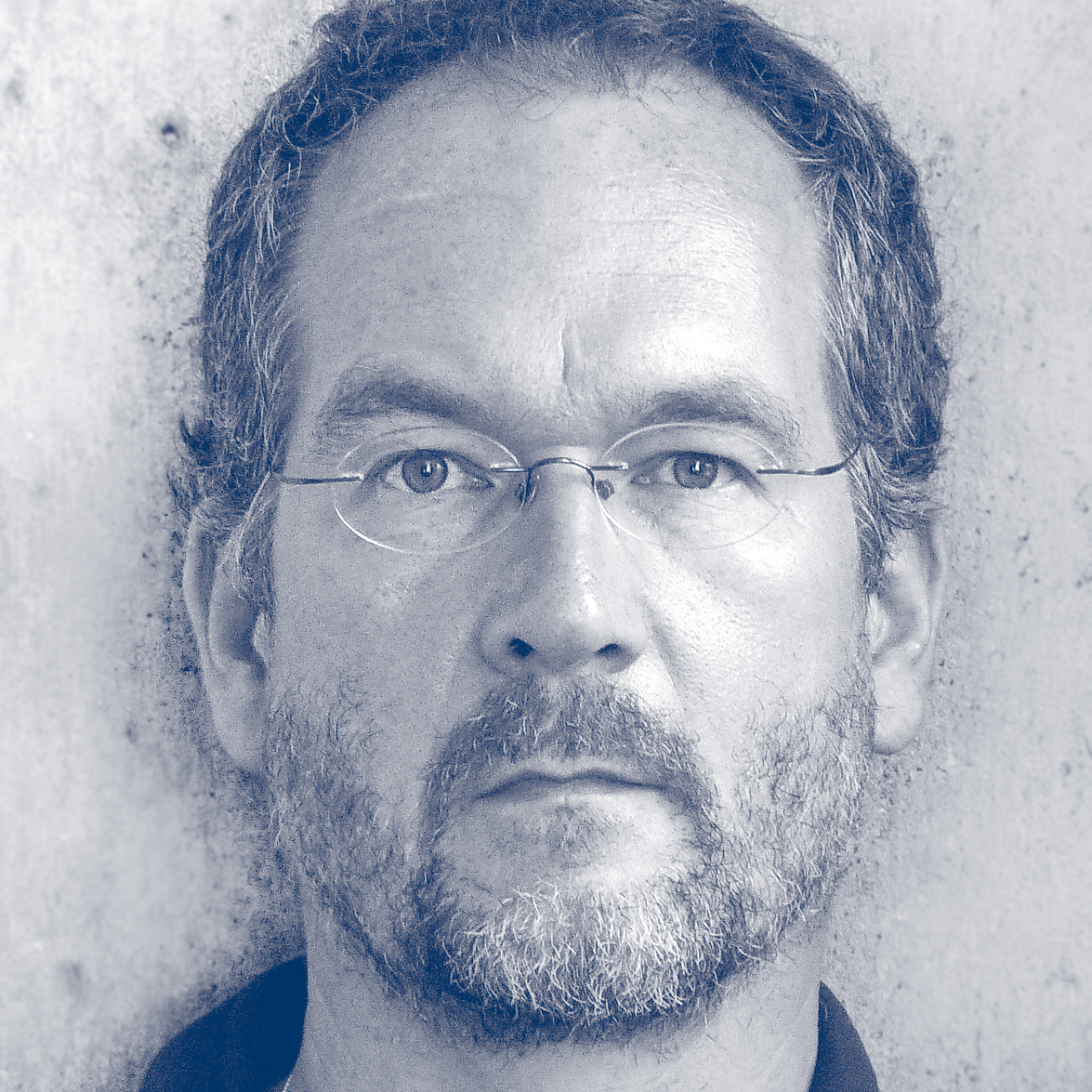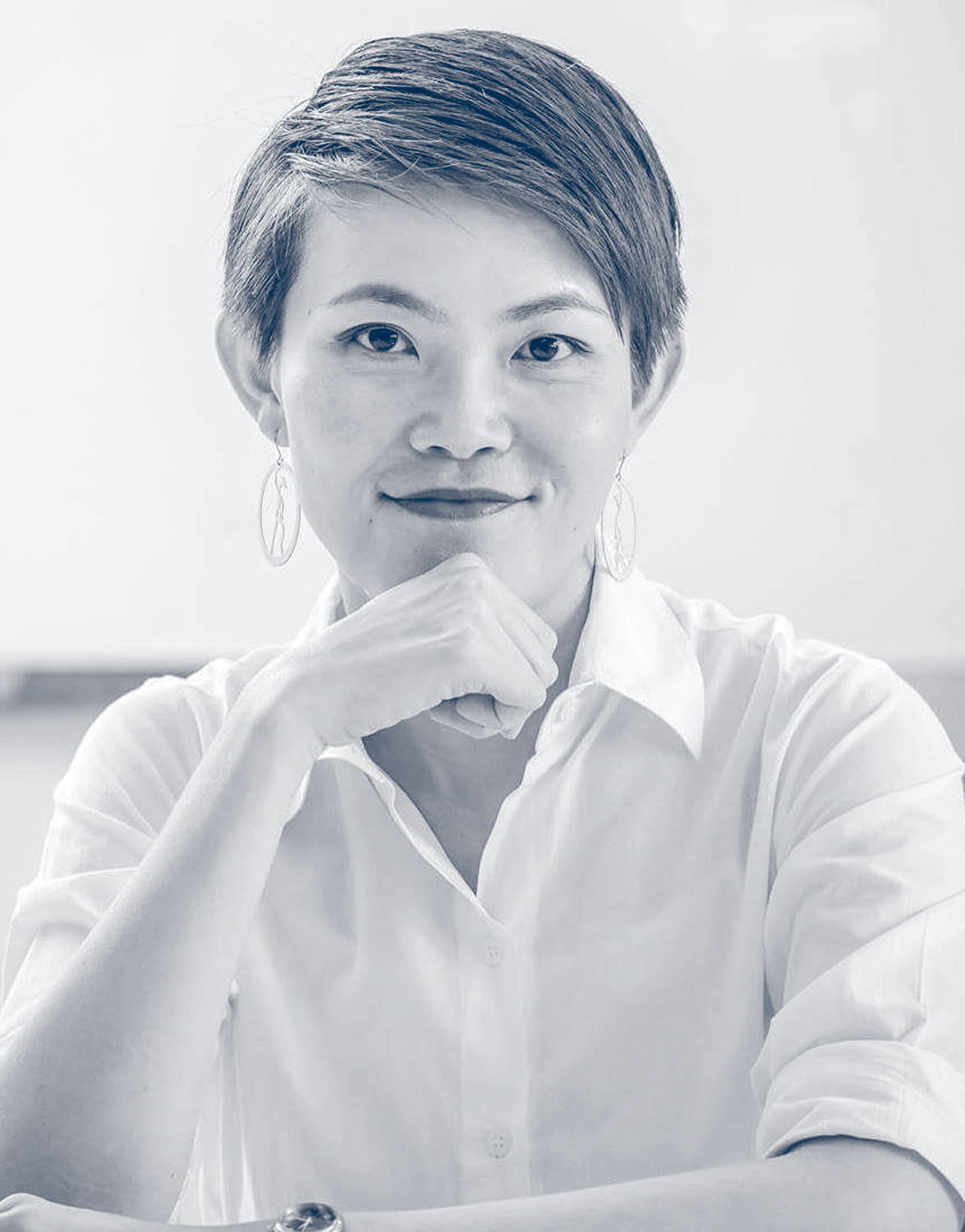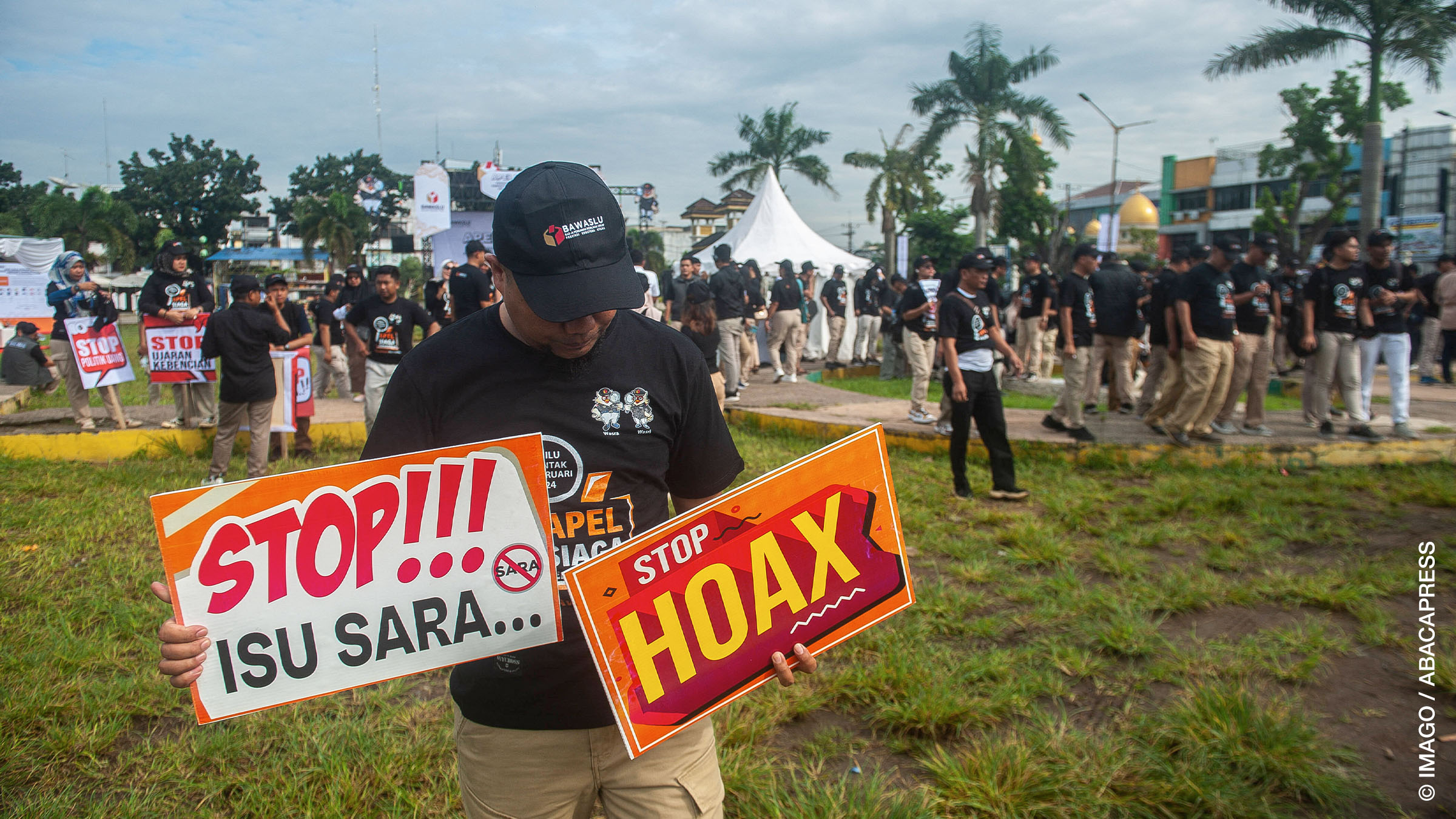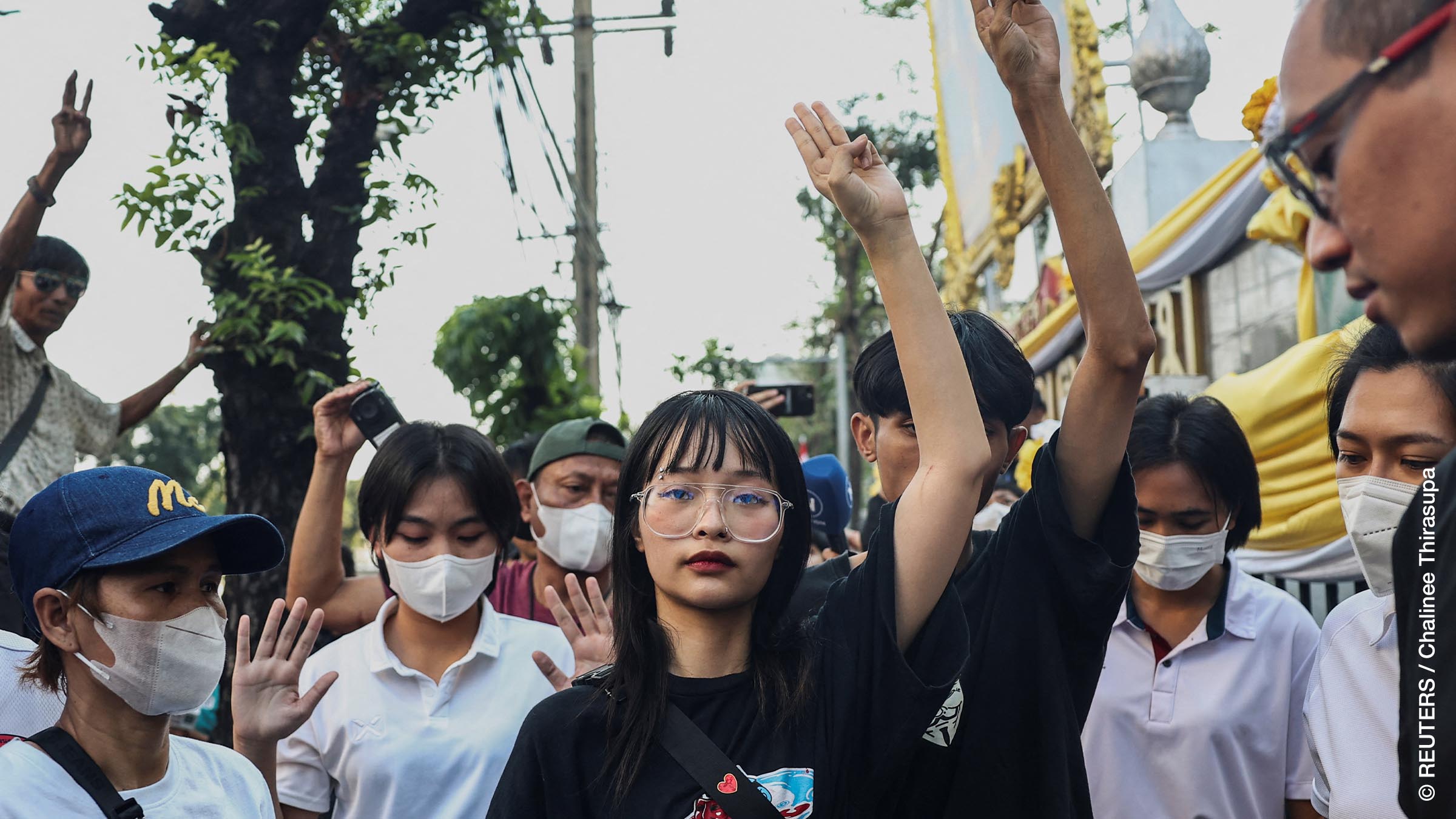- Home
- Publications
- GIGA Focus
- Repression by Legal Means: Governments’ Anti-Fake News Lawfare
GIGA Focus Global
Repression by Legal Means: Governments’ Anti-Fake News Lawfare
Number 1 | 2024 | ISSN: 1862-3581
The use of anti-fake news laws by governments to censor and criminalise critics and opponents is on the rise globally. We identify major trends and patterns regarding this form of lawfare in South and Southeast Asia, two regions with a large share of the world’s population, very high numbers of social media users, and a range of electoral democratic and authoritarian systems.
Law-enforcement agencies have expanded definitions of “fake news” to include criticisms of and opposition to the government, to further crack down on dissent. Fake news charges are often associated with other serious crimes, from criminal defamation to treason.
Key targets of fake news allegations include journalists and activists who rely on online platforms. Anti-fake news laws have increased illiberal governments’ coercive power over such platforms to take down civil society actors’ content and accounts, therewith denying them the space and capacity to operate.
Civil society targets face protracted legal battles incurring massive financial burdens and threats of imprisonment, which deplete their resources and energy. This has led many to self-censor or disengage from advocacy.
Despite this downwards trend, certain civil society actors have fought back against the misuse of these laws. Their tactics range from legal pushbacks to policy advocacy. Therein lies the potential for civil society resilience and resistance against an emerging pattern of repression.
Policy Implications
Anti-fake news lawfare can normalise illiberal governments’ control over the information ecosystem and civil society. The European Union could clarify the rules against the malafide interpretation and implementation of these laws, set policy standards for online platforms precluding their co-optation by illiberal regimes, and provide diverse forms of aid to civil society targets.
Anti-Fake News Lawfare: A Global Trend
Repression by anti-fake news laws is part of a larger trend wherein illiberal and/or autocratic governments rely on technological and digital means to suppress civil society’s rights and endeavours. Practices of digital repression are multifaceted, including Internet shutdowns, digital surveillance, online information manipulation, and state-backed disinformation campaigns (Feldstein 2021). The tactic of information manipulation is often intertwined with information control. Government agencies and government-aligned actors can manipulate online information to delegitimise critics (Bradshaw, Bailey, and Howard 2021) while simultaneously passing legislation that curtails information and controls civil society under the banner of fighting terrorism (Carothers and Brechenmacher 2014) – and, recently, “fake news.”
Fake news circulating via social and mainstream media, which undermines democratic integrity and social cohesion, certainly needs to be regulated. However, illiberal governments in parts of Africa, Asia, Europe, and Latin America (CNTI 2024: 1) have exploited global fake news rhetoric to impose laws with vague and subjective definitions of what constitutes such content. We deem such machinations “anti-fake news lawfare” (AFNL), or the weaponisation of laws by government authorities to fine, arrest, and imprison journalists and civil society actors critical of them. Trends from South and Southeast Asia accentuate the relevance of this wider global cause for concern, but at the same time provide lessons against AFNL’s routinisation as regulation.
So far, AFNL has detrimentally affected civil society’s rights to information and freedom of expression. From 2019 to 2023, 91 laws on fake news were enacted or amended globally in a context of declining civic rights (V-Dem 2023). While these laws are considered instrumental in combatting online disinformation, even well-intentioned regulations – such as the national legislation of 11 European Union countries (Ó Fathaigh, Helberger, and Appelman 2021) – could be misused by would-be autocrats and result in restricted press freedoms (CNTI 2024: 2). Through hefty fines and arbitrary arrest, fake news charges can overwhelm under-resourced media outlets (Lim and Bradshaw 2023).
In the course of 2024, over 50 countries will go to the polls. Among these, many have passed anti-fake news laws. Watchdog organisations warn that governments may deploy AFNL to regiment information and crack down on the opposition to gain the upper hand electorally (CNTI 2024: 3).
Mechanisms of AFNL: South and Southeast Asia as Trendsetters
Illiberal regimes in South and Southeast Asia that are characterised largely by the lack of due process and judicial independence set a global trend on AFNL. Examining these regions specifically allows us to elaborate on AFNL’s mechanisms and their impact on civil society. Since 2018, at least 14 countries in South and Southeast Asia have applied 26 legal measures against what they define as “fake news.” Among these, circumstances in Bangladesh, India, Indonesia, Malaysia, the Philippines, and Thailand attest to the weaponisation of anti-fake news laws by illiberal regimes with a weak rule of law. These countries represent more than one-quarter of the global population between them (Worldometer 2023). They are among the top 25 countries with the most social media users (Statista 2023). With journalists and civic organisations in these countries increasingly relying on digital platforms such as Facebook, YouTube, and X (formerly Twitter) to expose corruption and the abuse of power by the authorities, those concerned have experienced multidirectional on- and offline intimidation, including judicial harassment and smear campaigns. AFNL constitutes a key part of this playbook.
Our ongoing research, which informs the following, documents and analyses more than 200 cases coded in our database. Included in this are civic actors having been targeted by AFNL between 2018 and mid-2023 in the six aforementioned South and Southeast Asian countries. These targets were mainly journalists, academics, and activists as the major information actors from civil society. By “anti-fake news laws,” we refer to the legislation, executive orders, ministerial announcements, and regulations that have provisions on fake news or online false information. By “government actors,” we imply those representing central and local governing bodies, ruling parties, the bureaucracy, the armed forces, as well as their “proxies.” AFNL, accordingly, denotes the process by which these actors exploit such laws to target critics from civil society.
How Anti-Fake News Laws Are Weaponised
Laws can be weaponised when there is scope for subjectivity in both their interpretation and implementation. This tendency worsens in contexts seeing the declining rule of law. In the six countries, the following laws and regulations stand out for their frequency of use in the cases coded.
Table 1. The Six Countries’ Relevant Legislation
Country | Law |
Bangladesh | Digital Security Act (DSA) 2018 (Sections 25, 29, 31, and 35) |
India | Indian Penal Code 1860 (Sections 153A, 292, 295A, 499, 500, 503, 504, 505) |
Information Technology Act (IT Act) 2000 (Sections 67, 69, 79) | |
Disaster Management Act 2005 (Section 54) | |
Indonesia | Electronic Information and Transactions Law (ITE) (Article 27) |
Law No. 1/1946 (Articles 14 and 15) | |
Malaysia | Communication and Multimedia Act (CMA) 1998 (Section 233) |
Penal Code (Section 505) | |
Emergency (Essential Powers) (No.2) Ordinance 2021 | |
Thailand | The Computer-Related Crimes Act (CCA) 2007, amended in 2016 (Articles 14–16) |
Criminal Code (Sections 326–328 on defamation and Article 112 on royal defamation) | |
The Philippines | Cyber Crimes Prevention Act 2012 (Chapter 3, Section 4 (c) (4) on cyber libel) |
Bayanihan to Heal as One Act (Section 16(f)) |
Source: Authors’ own elaboration.
Except for Malaysia, which enforced the Anti-Fake News Act in 2018 and repealed it in 2019, government agencies in these countries have grafted fake news charges onto existing laws related to rumours, hoaxes, and false, misleading, or inciteful content. We find two common patterns to AFNL, whose deployment serves to increase the power of executive agencies.
First, the laws have vague and draconian provisions, allowing governments to determine what constitutes “fake news” and criminalisethose spreading it. The targets are often charged on grounds of “malicious intention” rather than on hard evidence. In our six countries, for example, a person or organisation can be charged if a government agency simply asserts that the accused was “knowingly” spreading fake news to cause harm. This is especially problematic when the definition of “fake news” expanded during COVID-19 to include criticisms of and exposéson the government. The pandemic endowed the executive with exceptional powers (Kuehn, Llanos, and Richter 2021), ones which have since been carried forwards in the execution of anti-fake news laws now.
Second, fake news offences are often equated with threats to public order, national security, communal harmony, friendly relations with other countries, and positioned as damaging the reputation of the state/regime. This is commensurate with a global pattern of targeting journalists for “spreading chaos” or “colluding against national security” (DW 2020). This makes fake news a high-order offence through association of its spreading with serious crimes. This may allow a government agency to charge a target without waiting for actual harm to be committed.
Securitising fake news offences leads to escalating punitive measures, from fines to jail terms or both. For example, Bangladesh’s Digital Security Act (DSA) allows the accused to be held in jail till the law-enforcement agency in question submits an investigation report within 60 days (with 15 days’ extension possible). Even the Cyber Security Act (Section 42), which substitutes the DSA, allows for search and arrest without a warrant. Malaysia’s Emergency (Essential Powers) (No.2) Ordinance 2021 also allowed police officers to arrest people without a warrant. Section 27 absolved government officers of liability.
We observe that most cases of AFNL against journalists and activists would not hold up in court given the opportunistic and opaque interpretation of these laws by the authorities. Accordingly, such approaches are designed to overwhelm the targets with multiple charges. In Thailand, for instance, the Computer-Related Crime Act (CCA) is often invoked against critics together with Article 112 of the Criminal Code (on royal defamation) to hike up penalties. In the Philippines, while charged with cyber libel (for the full title, see the table above), journalists are also slapped with (traditional) libel charges and publication-related laws. Further, we have found government agencies in these countries file complaints against or raid the offices of an entire editorial team and/or their CEOs. In Bangladesh and Thailand, social media users have, at times, been charged for sharing posts allegedly violating the DSA and CCA, respectively.
AFNL is modelled on defamation laws, which allow the victims hereof to file complaints against the accused. This is different from other laws criminalising civil society activities: for example, the public assembly or NGO laws that require the police to be the ones to initially lodge charges. It is this legal context that politicians and executive heads exploit by filing fake news charges against those journalists and civic actors who criticise and allegedly defame them. For example, Indonesian human rights activists Haris Azhar and Fatia Maulidiyanti were indicted by the Coordinating Minister for Maritime Affairs and Investment, Luhut Binsar Pandjaitan, because of a YouTube video they made on the business interests of Luhut and others with reference to gold mining in Papua. Although Haris and Fatia were eventually acquitted, lawfare was a convenient method to suppress their criticisms.
AFNL against the Regional Backdrop of Information Controls
Globally, AFNL often operates in a context of partisan application and tight government control over social media platforms. AFNL targets civic actors’ online spaces of operation by facilitating official requests for the taking down of content and accounts. This is done through passing IT and media rules that assert governments’ dominance over these platforms. A notable example is India’s Intermediary Guidelines and Digital Media Ethics Code (2021, updated on 6 April 2023), which compels big-tech platforms to appoint local compliance officers who are subject to criminal liability for failing to enforce government orders on content moderation. Social media platforms are hence more likely to censor the legitimate content of critics and opponents of a given regime than risk facing criminal prosecution. India is setting a global precedent of political control over such platforms (Bansal 2023).
In the six countries, AFNL has predominantly targeted critics and opponents for content they posted on Facebook, Twitter (X), and YouTube. These platforms’ degree of compliance with government directives has increased over the years. The fear of platforms getting co-opted by governments seeking to obtain further information about targets, their contacts, and their networks is also high across the six countries. Some of our interviewees also provided instances of their content being “shadow banned” (platforms making their posts less visible to other users). This has impacted them in terms of reach when it comes to supporters and funders.
ANFL’s Detrimental Impact on Civil Society
AFNL amplifies the existing pattern of judicial harassment by adding a greater legal arsenal with which the authorities can pursue trumped up charges against critics. This process of lawfare may not necessarily result in convictions carrying maximum sentences. Rather, it creates financial, organisational, and legal burdens for the targets, who face a number of different charges for a few online posts or clicking “like” on social media sites. In effect, this not only induces self-censorship in digital spaces but also undercuts the means and resources crucial to facilitating civil society actors’ work.
First, as allegations of spreading fake news are filed in tandem with other charges, the targets hereof are forced to bear the financial brunt of what comes next. Those concerned must pay bail, the travel expenses incurred from their place of residence to the police station (when summoned) and to court (during hearings), as well as judicial fees. This burden only increases as time goes by given that trials typically take years to reach their conclusion and the complaints are often filed in far-away locations. While in many cases we documented the people affected having received assistance from pro bono lawyers, some opted for private lawyers demanding high fees. AFNL, therefore, raises the threat of bankruptcy and is a form of “procedural harassment.” For example, Walden Bello, an academic and activist from the Philippines, was charged with two counts of cyber libel for his online criticism of an aide of Rodrigo Duterte’s daughter and current vice president Sarah Duterte. He estimated that he would need about USD 40,000 to cover all related expenses, including lawyer fees if his case reached the Supreme Court. Meanwhile, the Thai activists who protested against local authorities’ environmentally harmful practices and the central government’s abuse of power in 2020, respectively, received pro bono legal assistance. Despite this, the expenses incurred for four to five years of fighting court cases range from USD 10,000 to USD 15,000.
Fighting legal cases is also time-consuming, chipping away at the human resources of usually small and not-for-profit organisations and media outlets. In Thailand, an environmental activist was charged with spreading online false information under the CCA and defamation for posting about his offline protest that criticised local authorities’ environmental policy. He had to attend court hearings once a month for five years, making it harder for him to concentrate on his activism. Similarly, for small-sized online news outlets in Bangladesh, India, and Thailand, legal charges against their editorial teams for “conspiring to publish” false content meant diverting staff to work on legal defence rather than on journalism.
Fake news allegations reinforce the authorities’ physical and psychological intimidation of targets. Based on our database, most physical harassment transpired during the arrest and detention/imprisonment period and in Bangladesh, India, and Thailand predominantly. During the course of arrest, academics, activists, and journalists were manhandled; the police also raided both their places of work and of residence. In some cases, such as those of Prashant Kanojia (a journalist from India) and Ruma Sarkar (an academic from Bangladesh), charged under Section 66 of the IT Act 2000 and under the DSA, respectively, police raids were followed by each’s month-long detention before eventually being granted bail. Targets may face torture and even death while in custody. For instance, Mushtaq Ahmed, a prominent writer in Bangladesh, was charged under the DSA for posting online criticism of the government’s COVID-19 response in May 2020. Accused of spreading rumours on social media and tarnishing the image of the country’s founding father, he was detained without bail despite six requests for it. On 26 February 2021, he was declared dead in prison. The authorities claimed a heart attack to be the cause of death, but our interviewees, his peers, pointed to the prison’s dire conditions. Against the backdrop of a culture of impunity in Bangladesh, those wrongfully detained could not hold the responsible officers to account despite their right to do so under Article 9 of the International Covenant on Civil and Political Liberties (United Nations’ Human Rights Instruments 1966).
Those associated with primary targets may also find themselves subject to legal and physical intimidation. The legal harassment of Father Flavino Villanueva, charged with “conspiring” against the Philippines’ former president Rodrigo Duterte, made those under his care vulnerable to physical violence during the latter’s “War on Drugs.” This concern impacted Father Villanueva psychologically. Ultimately, activists, bloggers, and journalists constantly feel such (legal) threats hanging over their heads, thus experiencing chronic anxiety and fear of imprisonment.
These financial, organisational, physical, and psychological repercussions increase the costs of public participation by critical members of civil society. A few journalists we spoke to quit their jobs partly due to such manifold threats. For human rights defenders and political advocates, the spectre of AFNL hinders their digital activism and mobilisation. This is because the courts may sometimes bar the accused from posting online during trials. In Bangladesh and Indonesia, criticism of the authorities has become difficult, with hundreds facing AFNL measures for simply expressing their opinions on social media.
Possibilities for Pushback
Based on our consultations with affected civil society members, pushback strategies can be formulated as legal countermeasures and resilience-building initiatives. Similar to global efforts to circumvent AFNL by de-securitising the notion of “fake news,” repealing draconian related laws, and securing legal aid for journalists (Lim and Bradshaw 2023: 14–16), these two pushback strategies potentially reduce the costs of fighting court cases. Meanwhile, they may also deter government actors from weaponising such laws.
First, immediate legal responses can lessen the financial and procedural burdens of judicial intimidation. This includes institutionalising and expanding the networks of pro bono lawyers willing to defend the accused. Pro bono lawyers who form organisations such as the Thai Lawyers for Human Rights, the Indonesian Legal Aid Institute, and the Philippines’ Free Legal Assistance Group tend to have more robust institutional capacities than ad hoc networks of human rights lawyers. This institutionalisation is crucial for developing a sound legal learning curve in response to judicial harassment. After years of dealing with cyber-libel cases, some lawyers from the Philippines we interviewed had agreed on a common tactic in response: namely, getting these cases dismissed at the level of the prosecutor’s office rather than waiting until they reached the court. As of early 2024, the Thai parliament, supported by segments of civil society, is considering working with the incumbent cabinet to issue a government circular for prosecutors to drop criminal charges. This would include charges filed against critics of the previous military government under the CCA. If these measures are put in place, the cost of defending these cases will decrease substantially. Concurrently, unfairly accused activists or journalists can pursue “strategic litigation” against the authorities originally filing charges. While many we interviewed oppose using criminal codes, the idea is to file for “civil damages” in cases where the accused is subject to detention or mistreatment.
In the long run, preventing the abuse of AFNL would necessitate policy and legislative overhauls. Civil society organisations in Thailand have collaborated with legislators on amending the relevant laws, including clarifying what exactly constitutes the “falseness” of online information and dissociating this notion from criminality and national-security threats. In Bangladesh, Indonesia, and the Philippines, human rights lawyers and journalists have campaigned for decriminalising cyber-libel law and the Electronic Information and Transactions law (ITE), respectively. Further, fact-checkers in the region play an important role in resisting governments’ attempts to enforce the so-called anti-fake news laws in addition to existing draconian defamation laws. In the Philippines, academics and fact-checkers have taken part in congressional hearings, citing the unconstitutionality and ineffectiveness of criminalising “fake news.”
Second, capacity-building, cross-learning, and consolidating regional and international networks of fact-checkers render targets more resilient to AFNL measures. Digital rights groups such as Confluence Media, Digitally Right, SafeNet, and Thai Netizens work in tandem with lawyers to provide human rights defenders and journalists with training on constitutional rights and techniques to counter legal intimidation. This includes demanding that the police present a court-issued warrant upon a person’s arrest. Through network meetings and workshops, civil society actors often share pushback tactics such as how to raise the public profile of those accused so as to generate a backlash, the documenting of trials, and the “naming and shaming” of judges who refuse legitimate requests for bail. The transnational diffusion of knowledge and skills has long characterised activism across borders (Keck and Sikkink 1998). The insights from civil society actors can help us understand better how to transmit knowledge and skillsets in response to such lawfare. Relatedly, regional and international networks serve to strengthen domestic fact-checking organisations, which in turn, push for responsible reporting and defend investigative journalists from AFNL. Fact-checking organisations, including India’s AltNews, Indonesia’s MAFINDO, Malaysia’s Media Literacy Education, and Thailand’s CoFact not only fact check or promote information literacy but most importantly push back against governments’ legal opportunism and censorship under the guise of fighting “fake news.”
Recommendations
Autocratisation through illiberal practices takes place across different levels and social spheres at the same time. Given the enormous significance of digital communication, illiberal and/or autocratic governments are increasingly weaponising laws and regulations to restrict civic spaces, undermine the rule of law, and centralise decision-making. Strengthening data protection, regulating social media platforms, and tackling disinformation should be directly connected to the broader reform measures included in democracy-promotion programmes. Civil society activists around the world often examine and adopt laws from other countries/contexts, including the EU Digital Services Act (EU DSA), the German Netzwerkdurchsetzungsgesetz (NetzDG), or initiatives like the Anti-SLAPP (Strategic Litigation Against Public Participation)Directive discussed in the EU and United Kingdom. The EU, through its own laws on disinformation, could lend clarity to the legal definition of “disinformation,” grade levels of offence and punitive measures here, and specify how best to interpret and implement these laws.
This has major implications for the EU’s related regulations. At least 11 member states have implemented national legislation on “false information,” some of which criminalises the spreading of it and compels social media platforms to take down such content. The EU can set a global standard against government co-optation of these platforms by specifying when “false information” becomes “illegal content.” Further, the EU can influence its member states to frame disinformation laws in line with human rights- and democratic principles. Our analysis coincides with the European Commission’s warning on anti-disinformation legislation passed during COVID-19 leading to self-censorship and undermining freedom of expression (Ó Fathaigh, Helberger, and Appelman 2021). Ultimately, the EU could discourage hostile governments from extra-territorially applying AFNL against journalists and dissidents-in-exile by increasing the reputational costs of such measures.
Beyond legal redress, the EU-based funding agencies could also focus on fact-checking, providing legal aid to victims, expanding information literacy, and promoting best practice on content moderation – specifically with reference to local languages. Illiberal and/or autocratic governments often obstruct NGOs working on civil liberties from accessing overseas funding. To sustain pushback efforts, the EU can extend its financial support to vetted rights-promoting organisations and not just NGOs.
The EU could also better support the capacity-building and research activities of local organisations affected by AFNL. As these organisations have access to ground-level information on the latter, they can develop data-backed knowledge on digital repression and on grassroots communities’ countermeasures. This will help preserve information integrity and the democratic rights of civil society.
Footnotes
References
Bansal, Varsha (2023), India’s Government Wants Total Control of the Internet, Wired, 13 February, accessed 14 February 2023.
Bradshaw, Samantha, Hannah Bailey, and Philip N. Howard (2021), Industrialized Disinformation: 2020 Global Inventory of Organized Social Media Manipulation, Computation Propaganda Research Project, Oxford Internet Institute, 13 January, accessed 23 February 2024.
Carothers, Thomas, and Saskia Brechenmacher (2014), Closing Space. Democracy and Human Rights Support Under Fire, Carnegie Endowment for International Peace, 20 February, accessed 23 February 2024.
CNTI (Center for News, Technology & Innovation) (2024), Most ‘Fake News’ Legislation Risks Doing More Harm than Good amid Record Number of Elections in 2024, 31 January, accessed 31 January 2024.
DW (2020), Journalists under Threat: December’s 10 Most Urgent Cases, 12 January, accessed 3 December 2023.
Feldstein, Steven (2021), The Rise of Digital Repression: How Technology Is Reshaping Power, Politics, and Resistance, Oxford: Oxford University Press.
Keck, Magaret, and Kathryn Sikkink (1998), Activists beyond Borders: Advocacy Networks in International Politics, Ithaca: Cornell University Press.
Kuehn, David, Mariana Llanos, and Thomas Richter (2021), Executive Personalisation in the Time of COVID-19, GIGA Focus Global, 2, accessed 11 March 2024.
Lim, Gabrielle, and Samantha Bradshaw (2023), Chilling Legislation: Tracking the Impact of “Fake News” Laws on Press Freedom Internationally, Center for Media Assistance, 19 July, accessed 22 July 2023.
Ó Fathaigh, Ronan, Natali Helberger, and Naomi Appelman (2021), The Perils of Legally Defining Disinformation, in: Internet Policy Review, 10, 4, accessed 11 March 2024.
Statista (2023), Countries with the Largest Digital Populations in the World as of January 2023, accessed 23 November 2023.
United Nations’ Human Rights Instruments (1966), International Covenant on Civil and Political Liberties, accessed 5 December 2023.
V-Dem (2023), Democracy Report 2023. Defiance in the Face of Autocratization, accessed 12 January 2024.
Worldometer (2023), Countries in the World by Population, accessed 23 November 2023.
Editor GIGA Focus Global
Editorial Department GIGA Focus Global
Regional Institutes
Research Programmes
How to cite this article
Mahapatra, Sangeeta, Janjira Sombatpoonsiri, and Andreas Ufen (2024), Repression by Legal Means: Governments’ Anti-Fake News Lawfare, GIGA Focus Global, 1, Hamburg: German Institute for Global and Area Studies (GIGA), https://doi.org/10.57671/gfgl-24012
Imprint
The GIGA Focus is an Open Access publication and can be read on the Internet and downloaded free of charge at www.giga-hamburg.de/en/publications/giga-focus. According to the conditions of the Creative-Commons license Attribution-No Derivative Works 3.0, this publication may be freely duplicated, circulated, and made accessible to the public. The particular conditions include the correct indication of the initial publication as GIGA Focus and no changes in or abbreviation of texts.
The German Institute for Global and Area Studies (GIGA) – Leibniz-Institut für Globale und Regionale Studien in Hamburg publishes the Focus series on Africa, Asia, Latin America, the Middle East and global issues. The GIGA Focus is edited and published by the GIGA. The views and opinions expressed are solely those of the authors and do not necessarily reflect those of the institute. Authors alone are responsible for the content of their articles. GIGA and the authors cannot be held liable for any errors and omissions, or for any consequences arising from the use of the information provided.
